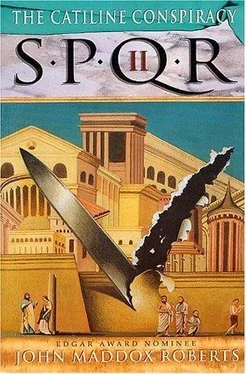John Roberts - The Catiline Conspiracy
Здесь есть возможность читать онлайн «John Roberts - The Catiline Conspiracy» весь текст электронной книги совершенно бесплатно (целиком полную версию без сокращений). В некоторых случаях можно слушать аудио, скачать через торрент в формате fb2 и присутствует краткое содержание. Жанр: Исторический детектив, на английском языке. Описание произведения, (предисловие) а так же отзывы посетителей доступны на портале библиотеки ЛибКат.
- Название:The Catiline Conspiracy
- Автор:
- Жанр:
- Год:неизвестен
- ISBN:нет данных
- Рейтинг книги:3 / 5. Голосов: 1
-
Избранное:Добавить в избранное
- Отзывы:
-
Ваша оценка:
- 60
- 1
- 2
- 3
- 4
- 5
The Catiline Conspiracy: краткое содержание, описание и аннотация
Предлагаем к чтению аннотацию, описание, краткое содержание или предисловие (зависит от того, что написал сам автор книги «The Catiline Conspiracy»). Если вы не нашли необходимую информацию о книге — напишите в комментариях, мы постараемся отыскать её.
The Catiline Conspiracy — читать онлайн бесплатно полную книгу (весь текст) целиком
Ниже представлен текст книги, разбитый по страницам. Система сохранения места последней прочитанной страницы, позволяет с удобством читать онлайн бесплатно книгу «The Catiline Conspiracy», без необходимости каждый раз заново искать на чём Вы остановились. Поставьте закладку, и сможете в любой момент перейти на страницу, на которой закончили чтение.
Интервал:
Закладка:
John Maddox Roberts
The Catiline Conspiracy
Chapter I
That summer we received the news that Mithridates was dead. It was hard to credit at first. Mithridates had been a thorn in our side for so long that he seemed like a force of nature, as immutable as sunrise. Only the oldest citizens could remember a time when Mithridates had not been there to plague us. He died old and friendless, somewhere in the Cimmerian Bosphorus, plotting yet another sally against Rome, this time an invasion of Italy by way of the Danube. He was the most consistent of enemies and we would miss him. The news came in the midst of a splendid summer, one of the finest in living memory. It was a time of peace and prosperity. The civil wars of Marius and Sulla were fast fading from memory, the horrors of their murders and proscriptions seeming to belong to another age. Everywhere, Rome was victorious. In the East, Pompey was the overwhelming victor. He had smashed the Mediterranean pirates and then he had gone on to subdue Asia, Pontus and Armenia, robbing Lucullus of the final glory for which he had fought so long and so honorably. Crete had been subdued after a long and desultory campaign. Who was left to threaten Rome? Carthage had been exterminated generations before, its ruins plowed under and sown with salt so that nothing would grow there. The East, from Cilicia to Palestine, was under the Roman heel, only remote Parthia remaining independent. To the south, Egypt was a joke, fat and indolent as an overfed crocodile. Africa and Numidia were muzzled. In the west, Spain was a taxpaying province. To the north were some Gallic tribes that had not yet been civilized, wearing long hair and trousers and providing the comic playwrights with good material for laughs.
The answer, of course, was that we Romans would ourselves provide the enemy. We were poised on the brink of yet another series of civil wars, convulsions so vast that they would be fought all over the world. The wars were still years in the future, but as I look back upon it, that was the last summer of the old Republic. It died in the fall.
None of that was apparent at the time, though. There are those who would argue that it never truly died, that our esteemed First Citizen actually restored the Republic. That is the talk of fools and toadies. I am now too old to care what the First Citizen thinks of me, so I will describe these events as I lived them. If his ancestor, the Divine Julius, comes out looking less than godlike, it is because I knew Caius Julius back then and the First Citizen didn't. Hardly surprising, considering that the First Citizen was born that year. Fitting, in a way.
None of these weighty matters troubled us that summer. The most serious political controversy of the day was the action of the Praetor Otho. Four years before, as Tribune of the People, he had introduced a law reserving fourteen rows of seats in the theater for the equites, the moneyed-but-not-noble class. Now, as praetor, he upheld it. There were no riots, but he was hissed every time he went to the theater.
The great event of the season was the triumph of Lucullus. He had returned to Italy almost four years earlier and had petitioned the senate for permission to celebrate a triumph in recognition of his victories over Mithridates and Tigranes. Pompey had manipulated the Tribunes to block this, but Lucullus had finally been granted permission. Until that time, he had been compelled, by ancient custom, to dwell outside the walls of Rome, where he had company. Quintus Marcius Rex, the victor of Cilicia, and a kinsman of mine, Quintus Caecilius Metellus Creticus, victor of Crete, were likewise blocked by Pompey's adherents from celebrating their hard-earned triumphs. Pompey had a simple interpretation of natural law: all the glory in the world belonged to him, and anybody else who got any was guilty of thieving.
The triumphal procession was a splendid one, for Lucullus had smashed some great armies and had taken immense booty at Tigranocerta and Artaxata and Nisibis. I watched this triumph wind its way into the Forum, from my place atop the Rostra, so I had a good view. First came the trumpeters, sounding shrill, snarling blasts on their instruments. Behind them came the standard-bearers of Lucullus's legions. These, like all soldiers in the procession, wore only their military boots and belts in token of their status. Armed soldiers were forbidden to enter the city by ancient law. After the standard-bearers came a float bearing a colossal reclining image of Jupiter with white sacrificial bulls in tow. Then there were more floats carried by soldiers, bearing great paintings of the battles. Then came more soldiers, all in snowy new tunics, gilded wreaths on their heads, palms of victory in their hands, draped with flower wreaths, showered with flower petals by pretty slave girls, accompanied by drummers and flute-players who kept up a shattering din.
Then there were trophy floats bearing the captured arms of the defeated enemy. These were artfully constructed to resemble the impromptu trophies set up on the battlefields in the old days, when the soldiers lopped the limbs from a nearby tree and hung it with captured weapons. Each of these floats bore such a tree, glittering with swords and spear-points, brilliant with polished armor and colorful with painted shields. Plumed helmets were scattered about among sheaves of arrows. Seated all around the bases of the trophies were dejected prisoners, bound and haltered. Considering the lapse in time between the victories and the triumph, these prisoners may have been hired stand-ins. After the trophies came yet more prisoners, more sacrificial animals, a whole train of musicians, and then the spectacle everyone was waiting for: the loot.
The gasps and cheers that greeted the plunder of Tigranocerta drowned out even the racket of the musicians. There were platters of solid gold, jeweled cups, chains of silver, carvings of ivory, chests decorated with amber, precious vases, crowns, scepters, fabulous works of art taken by the eastern monarchs from the Greek colonies. There were even signs painted on white wood giving the figures for ransoms and the sale of prisoners as slaves. There were bolts and heaps of brightly dyed silk, a fabric worth far more than its weight in gold. There were plain gold and silver bars, as large as building bricks and enough of them to build a medium-sized temple. All this was greeted with ecstatic outcries of Bacchic intensity. Say what you will about Romans as conquerors, we have always taken an honest delight in plunder, theft and rapine. It is one part of our souls that hypocrisy has never touched.
Finally, almost last in line, came the man of the hour, Lucius Licinius Lucullus Ponticus himself. The soldiers had already marched out of the city and had the gates shut behind them, because by yet another ancient law, a general and his soldiers could not be in the city at the same time. He looked like an Etruscan statue, dressed in a triumphal robe of Tyrian purple. Below his wreath of gilded laurel, his face was painted red, as were his hands which held a scepter and an olive branch. He rode in a gilded chariot drawn by four white horses and behind him stood a slave who, from time to time, whispered in his ear: "Remember, thou art mortal."
Last of all came one man, the most distinguished of the prisoners. Since Lucullus had not captured Mithridates, and Tigranes had made a deal with Pompey, this honor fell to one of the generals of Tigranocerta. The chariot rounded the Rostra and began its climb to the Capitol. At that time, the final prisoner was led away to the prison below the Capitol, where he was strangled. I could feel some sympathy for the man. I was clapped in the prison once, and it was an unpleasant place to occupy, much less to die in.
Читать дальшеИнтервал:
Закладка:
Похожие книги на «The Catiline Conspiracy»
Представляем Вашему вниманию похожие книги на «The Catiline Conspiracy» списком для выбора. Мы отобрали схожую по названию и смыслу литературу в надежде предоставить читателям больше вариантов отыскать новые, интересные, ещё непрочитанные произведения.
Обсуждение, отзывы о книге «The Catiline Conspiracy» и просто собственные мнения читателей. Оставьте ваши комментарии, напишите, что Вы думаете о произведении, его смысле или главных героях. Укажите что конкретно понравилось, а что нет, и почему Вы так считаете.










